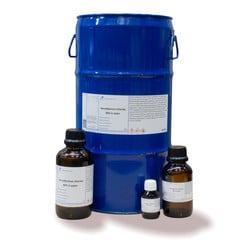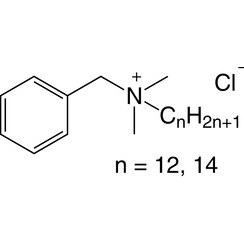You have no items in your shopping cart
Benzalkonium chloride
Benzalkonium chloride (BZK, BKC, BAK, BAC), also known as alkyldimethylbenzylammonium chloride (ADBAC) and by the trade name Zephiran, is a type of cationic surfactant. It is an organic salt classified as a quaternary ammonium compound. ADBACs have three main categories of use: as a biocide, a cationic surfactant, and a phase transfer agent. ADBACs are a mixture of alkylbenzyldimethylammonium chlorides, in which the alkyl group has various even-numbered alkyl chain lengths.
Especially for its antimicrobial activity, benzalkonium chloride is an active ingredient in many consumer products:
- Pharmaceutical products such as eye, ear and nasal drops or sprays, as a preservative
- Personal care products such as hand sanitizers, wet wipes, shampoos, soaps, deodorants and cosmetics
- Skin antiseptics and wound wash sprays, such as Bactine.
- Throat lozenges and mouthwashes, as a biocide
- Spermicidal creams
- Over-the-counter single-application treatments for herpes, cold-sores, and fever blisters, such as RELEEV and Viroxyn
- Burn and ulcer treatment
- Spray disinfectants for hard surface sanitization
- Cleaners for floor and hard surfaces as a disinfectant, such as Lysol and Dettol antibacterial spray and wipes.
- Algaecides for clearing of algae, moss, lichens from paths, roof tiles, swimming pools, masonry, etc.
Benzalkonium chloride is also used in many non-consumer processes and products, including as an active ingredient in surgical disinfection. A comprehensive list of uses includes industrial applications. An advantage of benzalkonium chloride, not shared by ethanol-based antiseptics or hydrogen peroxide antiseptic, is that it does not cause a burning sensation when applied to broken skin. However, prolonged or repeated skin contact may cause dermatitis.



